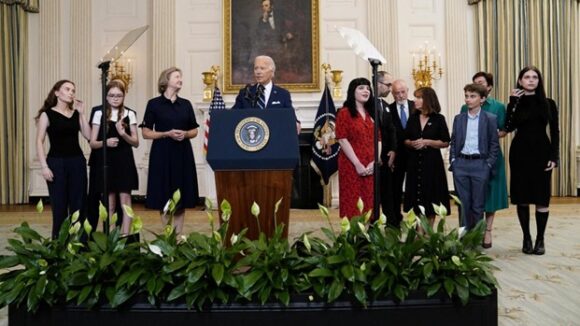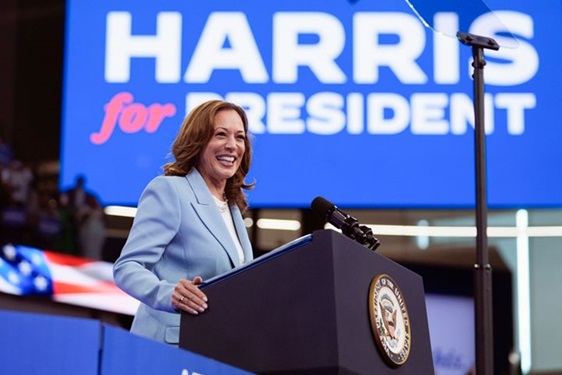 Andrew Feinberg – Communications Director of Kamala Harris Campaign
Andrew Feinberg – Communications Director of Kamala Harris Campaign
Dear Commons Community,
Donald Trump attended a Q&A with political journalists at the National Association of Black Journalists convention in Chicago yesterday, where, despite some internal opposition to Trump’s presence, NABJ President Ken Lemon promised those assembled “the opportunity … to ask the tough questions” of the twice-impeached former president.
Trump, who’s grown accustomed to softball questions from right-wing reporters, was clearly out of his league.
ABC News’ senior congressional correspondent Rachel Scott, who served as a moderator, opened with a question addressing “the elephant in the room.” The question is worth reading in its entirety:
“You have pushed false claims about some of your rivals, from Nikki Haley to former President Barack Obama, saying that they were not born in the United States — which is not true; you have told four congresswomen of color, who are American citizens, to ‘go back to where they came from’; you have used words like ‘animal’ and ‘rabid’ to describe Black district attorneys; you have attacked Black journalists, calling them ‘losers,’ saying the questions that they ask are ‘stupid’ and ‘racist’; you’ve had dinner with a white supremacist at your Mar-a-Lago resort.
So my question, sir: Now that you are asking Black supporters to vote for you, why should Black voters trust you after you have used language like that?”
Trump responded by attacking Scott herself, avoiding any substance entirely. “I don’t think I’ve ever been asked a question in such a horrible manner,” he said, to gasps from the audience.
“Are you with ABC? Because I think they’re a fake news network,” he told the journalist. “You’re a terrible network. And I think it’s disgraceful that I came here in good spirit. I love the Black population of this country. I’ve done so much for the Black population of this country.”
The back-and-forth only spiraled from there, despite softball questions from Fox News’ Harris Faulkner, who was also at the event as a moderator.
The Harris campaign pounced soon after the event concluded.
“Today’s tirade is simply a taste of the chaos and division that has been a hallmark of Trump’s MAGA rallies this entire campaign,” Harris spokesperson Michael Tyler said in an emailed statement.
Here are the five wildest moments from the panel, courtesy of The Huffington Post and journalist Aaron Rupar.
Trump panicked when asked why Black voters should trust him when he’s dined with a white supremacist at Mar-a-Lago.
Trump kept fuming even as the moderators moved on to new material, pausing amid a question about his age to refer to Scott as “this woman” and call her “very rude” and “nasty” while heckling an audience member.
Trump wouldn’t say if JD Vance is ready to be president.
When Faulkner asked Trump if his running mate would be “ready on day one” to step up as commander in chief, Trump side-stepped the question entirely.
“Historically, the vice president, in the terms of the election, does not have any impact. I mean virtually no impact,” he said. “Virtually never has it mattered.”
Trump questioned Kamala Harris’ identity and implied that a person could not be both Indian American and Black.
When Scott asked if it’s acceptable that Trump’s allies have called Harris ― who’s both the first Black and the first Asian American woman to serve as vice president ― a “DEI hire,” Trump again floundered.
“How do you define DEI?” Trump asked, apparently believing he had the upper hand. “Go ahead. How do you define it?”
“Diversity, equity and inclusion,” Scott responded.
“Ok… yeah, go ahead,” Trump replied, losing the thread. “Is that what your definition … Give me the definition, then.”
“That’s literally the words,” Scott said. “I just defined it, sir.” She then reminded Trump of her original question.
He responded that Harris “was always promoting Indian heritage. I didn’t know she was Black until a couple of years ago when she happened to turn Black. And now she wants to be known as Black, so I don’t know ― is she Indian or is she Black? She was Indian all the way and then she made a turn and she became a Black person. And I think somebody should look into that, too.”
Trump then accused Scott of being “hostile” and “nasty” after she informed him that Harris’ ethnicity has never changed.
After the event, White House press secretary Karine Jean-Pierre called Trump’s comments about Harris “repulsive.”
“No one has any right to tell someone who they are, how they identify,” she said, The Guardian reported. “She is the vice president of the United States. Kamala Harris. We have to put some respect on her name. Period.”
Trump said he wanted to stop “people at the border from taking Black jobs.”
When Faulkner asked Trump why he’d joined ysterday’s event, referencing America’s racial divisions, Trump ran in an unexpected direction.
“My message is to stop people from invading our country,” he said.
“One of the big problems ― and a lot of the journalists in this room I know and I have great respect for ― a lot of the journalists in this room are Black,” Trump continued, prompting some laughter as people anticipated what he would say next.
“Coming from the border are millions and millions of people that happen to be taking Black jobs,” he said.
Gasps turned to laughter when Scott asked, “What exactly is a Black job, sir?”
Trump responded, “A Black job is anybody who has a job.”
Trump needed to be reminded that “innocent” Jan. 6 rioters have been convicted of crimes.
When Scott asked Trump why, as someone who’s previously claimed to be the “law and order candidate,” he would pardon the rioters who assaulted the U.S. Capitol on Jan. 6, 2021, Trump short-circuited.
“Those rioters who assaulted officers. Would you pardon them?” Scott asked.
“Oh, absolutely I would. If they’re innocent? If they’re innocent I would pardon them,” he replied.
Scott noted: “They’ve been convicted.”
As the crowd laughed in disbelief, Trump dismissed the validity of the judicial system, saying, “Well, they were convicted by a very tough system.”
Senator Mark Kelly of Arizona when asked about Trump’s display at the NABJ commented that it was the performance of “an old, desperate, convicted felon.”
Amen!
Tony












